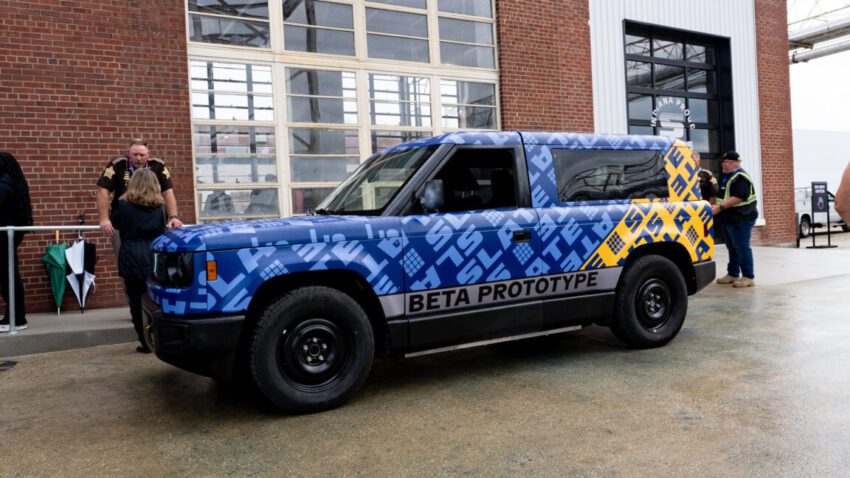
here s how slate auto plans to Slate Auto has unveiled its strategy for handling repairs for its upcoming electric trucks, addressing a critical concern for potential buyers.
here s how slate auto plans to
Introduction to Slate Auto and the Slate Truck
Earlier this year, Slate Auto emerged from stealth mode, capturing the attention of industry experts and consumers alike with the announcement of the Slate Truck. This compact electric pickup is set to retail for under $30,000, a price point that has raised eyebrows given the current market landscape for electric vehicles (EVs). The ambitious pricing strategy is part of Slate’s broader vision to disrupt the automotive industry, particularly in the EV sector, where high costs have often been a barrier to entry for many consumers.
Slate Auto’s approach is markedly different from established players like Tesla. One of the most notable aspects of the Slate Truck is its simplified design, comprising only 600 parts. This streamlined construction is intended to reduce manufacturing costs significantly. Additionally, the truck will not feature traditional paint or an infotainment system, further cutting down on expenses. This minimalist design philosophy not only aims to make the vehicle more affordable but also aligns with a growing trend toward sustainability and efficiency in manufacturing.
Addressing Repair Concerns
Despite the excitement surrounding the Slate Truck, a lingering question remained: where would consumers take their vehicles for repairs? This concern is particularly relevant in the EV market, where specialized knowledge and tools are often required for maintenance and repairs. Recognizing this gap, Slate Auto has announced a partnership with RepairPal, a company known for its extensive network of automotive service providers.
The RepairPal Partnership
Slate’s collaboration with RepairPal will leverage a network of over 4,000 service locations across the United States. This partnership aims to provide Slate Truck owners with peace of mind, knowing they have access to a wide range of repair options. Jeremy Snyder, Slate’s Chief Commercial Officer, emphasized the importance of this partnership, stating, “Slate’s OEM partnership with RepairPal’s nationwide network of service centers will give Slate customers peace of mind while empowering independent service shops to provide accessorization and service.”
This initiative is significant for several reasons. First, it addresses a common concern among potential EV buyers regarding the availability of service options. Many consumers are hesitant to invest in electric vehicles due to fears of limited repair facilities and the potential for high maintenance costs. By partnering with RepairPal, Slate is not only expanding its service network but also enhancing its brand reputation as a customer-centric company.
Implications for the EV Market
The partnership between Slate Auto and RepairPal could have broader implications for the electric vehicle market as a whole. As more consumers consider transitioning to electric vehicles, the availability of reliable and accessible repair services will be a crucial factor in their decision-making process. Slate’s proactive approach may set a precedent for other manufacturers, encouraging them to establish similar partnerships to enhance customer service and support.
Consumer Confidence and Market Dynamics
Consumer confidence in electric vehicles has been steadily increasing, but concerns about repair services can still deter potential buyers. By ensuring that Slate Truck owners have access to a robust network of service centers, Slate Auto is addressing one of the key barriers to widespread EV adoption. This could lead to increased sales and market share for Slate, particularly among budget-conscious consumers who may have previously viewed electric trucks as out of reach.
Moreover, the partnership with RepairPal may also encourage independent service shops to invest in training and resources to handle electric vehicle repairs. This could lead to a more knowledgeable workforce capable of servicing a growing number of electric vehicles on the road, ultimately benefiting the entire industry.
Challenges Ahead
While Slate Auto’s strategy appears promising, the company faces several challenges as it prepares to launch the Slate Truck. Achieving the target price of under $30,000 will require careful management of production costs and supply chain logistics. The automotive industry has been grappling with supply chain disruptions, particularly in the wake of the COVID-19 pandemic, which has affected the availability of key components and materials.
Supply Chain Considerations
To maintain its competitive pricing, Slate Auto will need to navigate these challenges effectively. This may involve establishing strong relationships with suppliers, optimizing production processes, and potentially exploring alternative materials to reduce costs. Additionally, the company will need to ensure that its vehicles meet safety and regulatory standards, which can add complexity to the manufacturing process.
Market Competition
The electric vehicle market is becoming increasingly crowded, with established manufacturers and new entrants vying for consumer attention. Companies like Tesla, Rivian, and Ford are already making significant strides in the EV space, and Slate Auto will need to differentiate itself to capture market share. The unique design and pricing strategy of the Slate Truck may provide a competitive edge, but the company must also focus on building a strong brand identity and customer loyalty.
Marketing and Consumer Engagement
Effective marketing will be crucial for Slate Auto as it prepares for the launch of the Slate Truck. Engaging with potential customers through social media, events, and community outreach can help build excitement and awareness around the brand. Additionally, providing transparent information about the vehicle’s features, benefits, and repair options will be essential in fostering trust among consumers.
Looking Ahead
As Slate Auto gears up for the launch of the Slate Truck, the partnership with RepairPal represents a significant step forward in addressing consumer concerns about repairs and maintenance. By offering a robust network of service options, Slate is positioning itself as a customer-focused brand in the competitive electric vehicle market.
Looking ahead, the success of the Slate Truck will depend on various factors, including production efficiency, market demand, and the company’s ability to navigate challenges in the automotive landscape. However, with its innovative approach and commitment to customer service, Slate Auto is poised to make a meaningful impact in the electric vehicle sector.
Conclusion
Slate Auto’s entry into the electric vehicle market with the Slate Truck marks a significant development for consumers seeking affordable and accessible electric transportation options. The partnership with RepairPal not only enhances the company’s service offerings but also addresses a critical concern for potential buyers. As the automotive industry continues to evolve, Slate Auto’s innovative strategies may serve as a model for future electric vehicle manufacturers, emphasizing the importance of customer support and service accessibility in driving adoption.
Source: Original report
Was this helpful?
Last Modified: October 29, 2025 at 4:37 am
0 views















